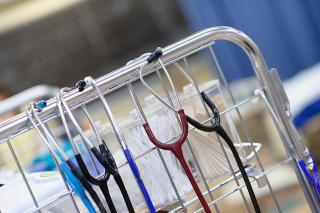During the ongoing global pandemic, COVID-19 misinformation continues to spread nearly as fast and as devastatingly as the virus itself. For example, Alabama health officials last month warned residents that social media posts claiming that someone died from the COVID-19 vaccine were false. Inaccurate information about the pandemic is so pervasive that the head of the International Federation of Red Cross president called “fake news” a second pandemic.
To help address this massive challenge of pandemic-related misinformation, Simmons University and a team of student interns are partnering with the national grassroots campaign, Doctors on Call, COVID-19 (#DocsOnCall).
Launched in March 2020, #DocsOnCall works to provide accessible and accurate information about COVID-19 to vulnerable communities through targeted media programming, social media and public service announcements.
Selma Chamime ’23, an economics major studying healthcare management, is one of the interns helping with the initiative. As part of her internship, she helps to produce 30-minute "Health Wrap" episodes, which air through Facebook and feature interviews with medical professionals and other experts on COVID-19 related topics. To finalize segments and produce the show, Chamime conducts daily research that includes reading articles and vetting news sites.
“This has been a great experience because I get to do my own research every day, and it forces me to stay on top of all the latest COVID-19 updates,” Chamime says. “I love the news, and I really enjoy working with this amazing team.”
The “Health Wrap” features segments by co-hosts Carolyn Sawyer and Karla Winfrey, who are adept at translating large amounts of information into accessible conversations you might have with a friend or neighbor.
“This pandemic has highlighted how misinformation can exacerbate existing health disparities and lead to poorer health outcomes for traditionally underserved communities, and that’s why this campaign is so vital,” says Co-Host Sawyer.
#DocsOnCall has already reached thousands of individuals on multiple social media platforms, such as Facebook, YouTube and Instagram. The partnership with Simmons is further expanding this effort and connecting citizens in vulnerable communities with the information and resources to better understand COVID-19 and make informed health decisions.
“Having accurate information about COVID-19 and the different vaccines are crucial in order for people to stay safe and healthy,” says Chamime.
The DocsOnCall partnership is also supported by a $250,000 grant from the W.K. Kellogg Foundation of Battle, Creek, Mich. The grant, which runs from September 1, 2020 through August 31, 2021, enables Simmons students to gain hands-on experience during the pandemic.
“We are grateful to be able to draw on the passion and commitment of our students to support the vital work #DocsOnCall is doing to help address some of the social justice and racial equity issues that have been exacerbated by this pandemic,” said Meenakshi Verma-Agrawal, Assistant Program Director and Associate Professor of Practice at Simmons’ Master of Public Health program.
One of the unique aspects of the partnership is its multidisciplinary approach that is bringing together Simmons’ Gwen Ifill College of Media, Arts, and Humanities, the School of Social Work, the Master’s Program in Public Health, and the President’s Advisory Council on Diversity, Equity, and Inclusion.
“It’s been hard this semester and feeling isolated during the pandemic,” Chamime says. “I haven’t seen many peers, so working with other Simmons students has been such a huge highlight. We’re all from different backgrounds and majors and we bring our unique perspectives to this initiative.”
Chamime says that her experience will have a lasting impact that extends far beyond COVID-19, particularly when it comes to analyzing news and information.
“During this internship, I’ve been trained to really look at information and question whether something is accurate,” Chamime says. “It’s important to determine if something is reliable. We consume so much propaganda. People don’t always know what is real versus what is made up by some random person on the internet.”

